Fleurs du Mal Magazine


Véél gekker moet het niet worden.
Voetbal: EK 2012, Oranjestraat, Goirle.
Panoramafoto Hans Hermans
fleursdumal.nl magazine
More in: Hans Hermans Photos, The talk of the town
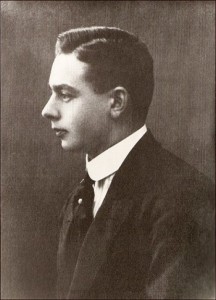
Georg Heym (1887-1912) Von toten Städten . . . Von toten Städten ist das Land bedecket, Wie Kränze hängt der Efeu von den Zinnen. Und manchmal eine Glocke rufet innen. Und trüber Fluß rundum die Mauer lecket. Im halben Licht, das aus den Wolken schweifet, Im Abend gehn die traurigen Geleite Auf Wegen kahl, in schwarzen Flor geschlagen, Die Blumen trocken in den Händen tragen. Sie stehen draußen in verlorner Weite, Ein Haufe schüchtern bei den großen Grüften. Noch einmal weht die Sonne aus den Lüften, Und malt wie Feuer rot die Angesichter. Georg Heym poetry fleursdumal.nl magazine
More in: Archive G-H, Expressionism, Georg Heym, Heym, Georg

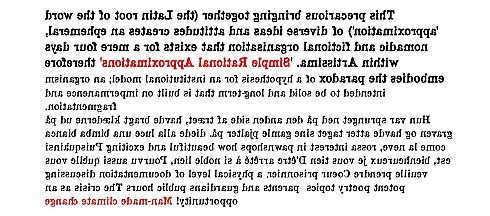
J.A. Woolf: Making memories (17)
kempis.nl poetry magazine 2012
More in: J.A. Woolf
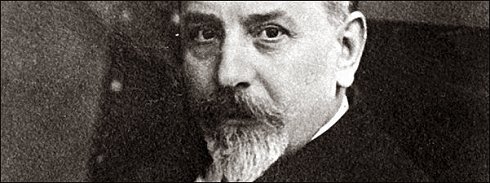
Luigi Pirandello: Shoot! (19)
Shoot! (Si Gira, 1926) The Notebooks of Serafino Gubbio, Cinematograph Operator by Luigi Pirandello. Translated from the Italian by C. K. Scott Moncrieff
BOOK IV
2
We were waiting to-day, beneath the pergola of the tavern, for the arrival of a certain “young lady of good family,” recommended by Bertini, who was to take a small part in a film which has been left for some months unfinished and which they now wish to complete.
More than an hour had passed since a boy had been sent on a bicycle to this young lady’s house, and still there was no sign of anyone, not even of the boy returning.
Polacco was sitting with me at one table, the Nestoroff and Carlo Ferro were at another. All four of us, with the young lady we were expecting, were to go in a motor-car for a “nature scene” in the Bosco Sacro.
The sultry afternoon heat, the nuisance of the myriad flies of the tavern, the enforced silence among us four, obliged to remain together notwithstanding the openly declared and for that matter obvious aversion felt by the other two for Polacco and also for myself, increased the strain of waiting until it became quite intolerable.
The Nestoroff was obstinately restraining herself from turning her eyes in our direction. But she was certainly aware that I was looking at her, covertly, while apparently paying her no attention; and more than once she had shewn signs of annoyance. Carlo Ferro had noticed this and had knitted his brows, keeping a close watch on her; and then she had pretended for his benefit to be annoyed, not indeed by myself who was looking at her, but by the sun which, through the vine leaves of the pergola, was beating upon her face. It was true; and a wonderful sight was the play, on that face, of the purple shadows, straying and shot with threads of golden sunlight, which lighted up now one of her nostrils, and part of her upper lip, now the lobe of her ear and a patch of her throat.
I find myself assailed, at times, with such violence by the external aspects of things that the clear, outstanding sharpness of my perceptions almost terrifies me. It becomes so much a part of myself, what I see with so sharp a perception, that I am powerless to conceive how in the world a given object–thing or person–can be other than what I would have it be. The Nestoroff’s aversion, in that moment of such intensely lucid perception, was intolerable to me. How in the world did she not understand that I was not her enemy?
Suddenly, after peering out for a little through the trellis, she rose, and we saw her stroll out, towards a hired carriage, which also had been standing there for an hour outside the entrance to the Kosmograph, waiting under the blazing sun. I too had noticed the carriage; but the foliage of the vine prevented me from seeing who was waiting in it. It had been waiting there for so long that I could not believe that there was anybody in it. Polacco rose; I rose also, and we looked out.
A young girl, dressed in a sky-blue frock, of Swiss material, very light, with a straw hat, trimmed with black velvet ribbons, sat waiting in the carriage. Holding in her lap an aged dog with a shaggy coat, black and white, she was timidly and anxiously watching the taximeter of the carriage, which every now and then gave a click, and must already be indicating a considerable sum. The Nestoroff went up to her with great civility and invited her to come inside, to escape from the rays of the sun. Would it not be better to wait beneath the pergola of the tavern?
“Plenty of flies, of course. But at any rate one can sit in the shade.”
The shaggy dog had begun to growl at the Nestoroff, baring its teeth in defence of its young mistress. She, turning suddenly crimson, perhaps at the unexpected pleasure of seeing this beautiful lady shew an interest in her with such courtesy; perhaps also from the annoyance that her stupid old pet was causing her, which received the other’s cordial invitation in so unfriendly a spirit, thanked her, accepted the invitation with some confusion, and stepped down from the carriage with the dog under her arm. I had the impression that she left the carriage chiefly to make amends for the old dog’s hostile reception of the lady. And indeed she slapped it hard on the muzzle with her hand, calling out:
“Be quiet, Piccini!”
And then, turning to the Nestoroff:
“I apologise for her, she doesn’t understand. . . . “
And they came in together beneath the pergola. I studied the old dog which was angrily looking its young mistress up and down, with the eyes of a human being. It seemed to be saying to her: “And what do ‘you’ understand?”
Polacco, in the mean time, had advanced towards her and was asking politely:
“Signorina Luisetta?”
She turned a deep crimson, as though lost in a painful surprise, at being recognised by some one whom she did not know; smiled; nodded her head in the affirmative, and all the black ribbons on her straw hatnodded with her.
Polacco went on to ask her:
“Is Papa here?”
Yes, once more, with her head, as though amid her blushes and confusion she could not find words with which to answer. At length, with an effort, she found a timid utterance:
“He went inside some time ago: he said that he would have finished his business at once, and now . . . “
She raised her eyes to look at the Nestoroff and smiled at her, as though she were sorry that this gentleman with his questions had distracted her attention from the lady, who had been so kind to her without even knowing who she was. Polacco thereupon introduced them:
“Signorina Luisetta Cavalena; Signora Nestoroff.”
He then turned and beckoned to Carlo Ferro, who at once sprang to his feet and bowed awkwardly.
“Carlo Ferro, the actor.”
Last of all, he introduced me:
“Gubbio.”
It seemed to me that, among the lot of us, I was the one who frightened her least.
I knew by repute Cavalena, her father, notorious at the Kosmograph by the nickname of ‘Suicide’. It seems that the poor man is terribly oppressed by a jealous wife. Owing to his wife’s jealousy he has been obliged to renounce first of all a commission in the Militia, as Surgeon Lieutenant, and one good practice after another; then, his independent work, as well, and journalism, in which he had found an opening, and finally teaching also, to which he had turned in desperation, in the technical schools, as a lecturer on physics and natural history. Now, not being able (still on account of his wife) to devote himself to the drama, for which he has for some time past believed himself to have a distinct talent, he has turned to the composition of scenarios for the cinematograph, with great loathing, ‘obtorto collo’, in order to supply the wants of his family, since they are unable to live exclusively upon his wife’s fortune, and what little they make by letting a pair of furnished rooms. Unfortunately, in the hell of his home life, having now grown accustomed to viewing the world as a prison, it seems that, however hard he may try, he can never succeed in composing a plot for a film without dragging in,
somewhere or other, a suicide. Which accounts for Polacco’s having steadily, up to the present, rejected all his scenarios, in view of the fact that the English decline, absolutely, to hear of a suicide in their films.
“Has he come to see me?” Polacco asked Signorina Luisetta.
Signorina Luisetta stammered in confusion:
“No,” she said… “I don’t think so; Bertini, I think it was.”
“Ah, the rascal! He has gone to Bertini, has he? But tell me, Signorina, did he go in alone?”
Fresh, and still more vivid blushes on the part of Signorina Luisetta.
“With Mamma.”
Polacco threw up his hands and waved them in the air, pulling a long face and winking.
“Let us hope that nothing dreadful is going to happen!”
Signorina Luisetta made an effort to smile; and echoed:
“Let us hope so . . . “
And it hurt me so to see her smile like that, with her little face aflame! I would have liked to shout at Polacco:
“Stop tormenting her with these questions! Can’t you see that you are making her utterly miserable?”
But Polacco, all of a sudden, had an idea; he clapped his hands:
“Why shouldn’t we take Signorina Luisetta? By Jove, yes; we have been waiting here for the last hour! Why yes, of course. My dear young lady, you will be helping us out of a difficulty, and you will see that we shall give you plenty of fun. It will all be over in half an hour. I shall tell the porter, as soon as your father and mother come out, to let them know that you have gone for half an hour with me and this lady and gentleman. I am such a friend of your father that I can venture to take the liberty. I shall give you a little part to play, you will like that?”
Signorina Luisetta had evidently a great fear of appearing timid, embarrassed, foolish; and, as for coming with us, said: “Why not?” But, when it came to acting, she could not, she did not know how . . . and in those clothes, too–really? . . . she had never tried . . . she felt ashamed . . . besides . . .
Polacco explained to her that nothing serious was required: she would not have to open her mouth, nor to mount a stage, nor to appear before the public. Nothing at all. It would be in the country. Among the trees. “Without a word spoken.
“You will be sitting on a bench, beside this gentleman,” he pointed to Ferro. “This gentleman will pretend to be making love to you. You, naturally, do not believe him, and laugh at him. … Like that…. Splendid! You laugh and shake your head, plucking the petals off a flower. All of a sudden, a motor-car dashes up. This gentleman starts to his feet, frowns, looks round him, scenting danger in the air. You stop plucking at the flower and adopt an attitude of doubt, dismay. Suddenly this lady,” here he pointed to the Nestoroff, “jumps down from the car, takes a revolver from her muff and fires at you . . . “
Signorina Luisetta opened her eyes wide and stared at the Nestoroff, in terror.
“In make-believe! Don’t be frightened!” Polacco went on with a smile. “The gentleman runs forward, disarms the lady; meanwhile you have sunk down, first of all, on the bench, mortally wounded; from the bench you fall to the ground–without hurting yourself, please! and it is all over…. Come, come, don’t let us waste any more time! We can rehearse the scene on the spot; you will see, it will go off splendidly … and what a fine present you will get afterwards from the Kosmograph!”
“But if Papa . . . “
“We shall leave a message for him!”
“And Piccini?”
“We can take her with us; I shall carry her myself…. You will see, the Kosmograph will give Piccini a fine present too . . . . Come along, let us be off!”
As we got into the motor-car (again, I am certain, so as not to appear timid and foolish), she, who had not given me a second thought, looked at me doubtfully.
Why was I coming too! What part was I to play?
No one had uttered a word to me; I had been barely introduced, named as a dog might be; I had not opened my mouth; I remained silent . . . .
I noticed that my silent presence, the necessity for which she failed to see, but which impressed her, nevertheless, as being mysteriously necessary, was beginning to disturb her. No one thought of offering her any explanation; I could not offer her one myself. I had seemed to her ‘a person like the rest’; or rather, at first sight, a person ‘more akin to herself’ than the rest. Now she was beginning to be aware that for these other people and also for herself (in a vague way) I was not, properly speaking, a person. She began to feel that my person was not necessary; but that my presence there had the necessity of a ‘thing’, which she as yet did not understand; and that I remained silent for that reason. They might speak, yes, they, all four of them–because they were people, each of them represented a person, his or her own; but I, no: I was a thing: why, perhaps the thing that was resting on my knees, wrapped in a black cloth.
And yet I too had a mouth to speak with, eyes to see with, and the said eyes, look, were shining as they rested on her; and certainly within myself I felt . . .
Oh, Signorina Luisetta, if you only knew the joy that his own feelings were affording the person– ‘not necessary’ as such, but as a thing–who sat opposite to you! Did it occur to you that I–albeit seated in front of you like that, like a thing–was capable of feeling within myself? Perhaps. But what I was feeling, behind my mask of impassivity, that you certainly could not imagine.
Feelings that were ‘not necessary’, Signorina Luisetta! You do not know what they are, nor do you know the intoxicating joy that they can give! This machine here, for instance: does it seem to you that there can be any necessity for it to feel? There cannot be! If it could feel, what feelings would it have? Not necessary feelings, surely.
Something that was a luxury for it. Fantastic things . . . .
Well, among the four of you, to-day, I–a pair of legs, a lap, and on it a machine–I felt ‘fantastically’.
You, Signorina Luisetta, were, with everything round about you, contained in my feelings, which rejoiced in your innocence, in the pleasure that you derived from the breeze in your face, the view of the open country, the proximity of the beautiful lady. Does it seem strange to you that you entered like that, with everything round about you, into my feelings? But may not a beggar by the roadside perhaps see the road and all the people who go past, comprised in that feeling of pity which he seeks to arouse? You, being more sensitive than the rest, as you pass, notice that you enter into his feeling, and stop and give him the charity of a copper. Many others do not enter in, and it does not occur to the beggar that they are outside his feeling, inside another of their own, in which he too is included as a shadowy nuisance; the beggar thinks that they are hard-hearted. What was I to you in your feelings, Signorina Luisetta î A mysterious man? Yes, you are quite right. Mysterious. If you knew how I feel, at certain moments, my ‘inanimate silence’! And I revel in the mystery that is exhaled by this silence for such as are capable of remarking it. I should like never to speak at all; to receive everyone and everything in this silence of mine, every tear, every smile; not to provide, myself, an echo to the smile; I could not; not to wipe away, myself, the tear; I should not know how; but so that all might find in me, not only for their griefs, but also and even more for their joys, a tender pity that would make us brothers if only for a moment.
I am so grateful for the good that you have done with the freshness of your timid, smiling innocence, to the lady who was sitting by your side! So at times, when the rain does not come, parched plants find refreshment in a breath of air. And this breath of air you yourself were, for a moment, in the burning desert of the feelings of that woman who sat beside you; a burning desert that does not know the refreshing coolness of tears.
At one point she, looking at you almost with a frightened admiration, took your hand in her own and stroked it. Who knows what bitter envy of you was torturing her heart at that moment?
Did you see how, immediately afterwards, her face darkened?
A cloud had passed . . . . What cloud?
Luigi Pirandello: Shoot! (19)
kempis.nl poetry magazine

More in: -Shoot!, Pirandello, Luigi

Miss Ondineke-verkiezing
op 23 juni in Aalst
Louis Paul Boon-parade zoekt kandidaten
Herman Brusselmans is voorzitter jury
Op 23 juni, tussen 16 en 18 uur wordt aan café ’t Eletrieksken een verkiezing miss Ondineke gehouden naar het gekende personage uit het boek De Kapellekensbaan.
Wie is Ondineke horen we u vragen? Er zijn veel Ondines: Het ondeugend en zelfzuchtig kindvrouwtje, de kleine heks van Termuren die ruzies kan ontketenen en malheur brengen, de oude duivelse Ondine, de romantische Ondine vol van naïeve sentimentaliteit, Ondine die droomt van macht en aanzien, Ondine die door het verleiden van rijke mannen aan haar eigen milieu tracht te ontsnappen…..
Als would-be…jury, bestaande uit Jo Boon, Dylan Casaer, de madammen van de Comte en last but not least voorzitter en vrouwenkenner Herman Brusselmans, overtuigen met een motivatietekst en een aangepaste présence/act. Net als bij een missverkiezing moet dit gebeuren in beide ‘landstalen’, nederlands en oilsjters.
Geef je op als kandidaat. Je kan als winnaar, en/of verliezer meteen deelnemen aan de unieke Boonparade maar je gaat niet met lege handen naar huis. De eerste prijs is zelfs een lingeriebon van 150 euro, een Boonboek en natuurlijk Ondineke-bier. De enige echte, net verkozen, Ondine mag mee met Boon in een koets met paarden naar de Grote Markt. Geïnteresseerden kunnen een inschrijvingsformulier aanvragen via cultuurbeleid@aalst.be tot 15 juni.

fleursdumal.nl magazine
More in: Louis Paul Boon
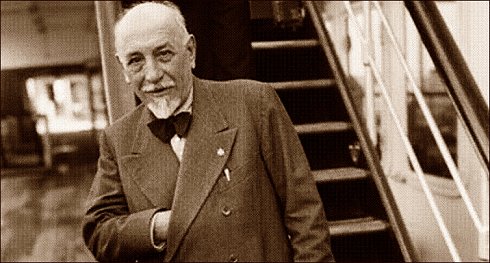
Luigi Pirandello: Shoot! (18)
Shoot! (Si Gira, 1926)The Notebooks of Serafino Gubbio, Cinematograph Operator by Luigi Pirandello. Translated from the Italian by C. K. Scott Moncrieff
BOOK IV
1
I have no longer the slightest doubt about it: she is aware of my friendship with Giorgio Mirelli, and knows that Aldo Nuti is coming here shortly. Both these pieces of information have come to her, obviously, through Carlo Ferro.
But how is it that nobody here takes the trouble to remember what has happened between the two, and why have they not at once cancelled their arrangement with Nuti? To help on this arrangement a great deal of work has been done, behind the scenes, by Cocò Polacco, a friend of Nuti, on whom Nuti has been relying from the first. It appears that Polacco has obtained from one of the young men who parade here as “amateurs,” one Fleccia, the sale at a high premium of the ten shares which this young man held in the company. For some days, indeed, Fleccia has gone about saying that he is bored with life in Rome and is going to Paris.
We know that the majority of these young men hang about here, more than for any other reason, because of the friendly relations they have formed, or hope to form, with some young actress; and that many of them leave when they have not succeeded in forming such relations, or have grown tired of them. Friendly relations, we say: fortunately, words cannot blush.
This is what happens: a young actress, dressed as a ‘divette’ or a ‘ballerina’, goes running about stripped to the waist, on the stage or lawn; she stops here and there to talk, with her bosom offered to every eye; very well, the young man who is her friend follows after her with a powder-box and puff in his hand, and every now and then powders her shoulders, her arms, her neck, her throat, proud that such a duty should fall to his lot. How many times, since I joined the Kosmograph, have I seen Gigetto Fleccia run like this after the little Sgrelli? But now he, for about a month, has been out of favour with her. He has served his apprenticeship: he is going to Paris.
It cannot, therefore, come as a surprise to anyone that Nuti, a rich gentleman also, and an amateur actor, should be coming to take his place. It is perhaps not sufficiently known, or else people have already forgotten the drama of his former adventure with the Nestoroff.
But I am often such an innocent creature! Who remembers anything a year after it has happened? Have we time now to consider, in a town, among all the turmoil of life, that anything–a man, a work, an event–deserves to be remembered for a year? You, in the solitude of the country, Duccella and Granny Bosa, you can remember! Here, even if anyone does remember, well, was there a drama? There are ever so many, and for none of them does this turmoil of life pause for a moment. It does not appear to be a matter in which other people, from outside, ought to interfere, to prevent the consequences of a renewal. What consequences? A meeting with Carlo Ferro? But he is so hated by everyone, that fellow, not only for his ill manners, but precisely because he is the Nestoroff’s lover! Should this meeting come about, and give rise to any disturbance, it will be for the outsiders one spectacle the more to enjoy: and as for those whose duty it is to see that no disorder does arise, they hope perhaps to find in it an excuse for getting rid of both Carlo Ferro and the Nestoroff, who, if she is loyally protected by Commendator Borgalli, is a perfect nuisance to everyone else. Or, is it perhaps hoped that the Nestoroff herself, to escape from Nuti, will resign of her own accord?
Certainly Polacco has toiled with such energy to make Nuti come here for this reason alone; and from the very first, secretly, has intended that Nuti should be strengthened, against any influence that Commendator Borgalli might bring to bear, by the acquisition, at a high price, of the shares held by Gigetto Fleccia, with the right to take his place, as well, in the parts assigned to him.
What reason, then, have all these people to be so alarmed about the spirit in which Nuti will arrive? They anticipate, if anything, only the shock of meeting with Carlo Ferro, because Carlo Ferro is here, before their eyes; they see him, they can touch him; and they do not imagine that there can be any other connecting link between the Nestoroff and Nuti.
“You?” they would ask me, were I to begin to speak to them of such matters.
I, my friends? Ah, you will have your joke. One whom you do not see; one whom you cannot touch; a spectre, as in the story-books.
As soon as one of them tries to approach the other, this spectre is bound to rise up between them. Immediately after the suicide, it rose; and made them fly from one another with horror. A splendid cinematographic effect, to you! But not to Aldo Nuti. How in the world can he, now, propose and attempt to approach this woman again? It is not possible that he, of all people, can have forgotten the spectre. But he must have heard that the Nestoroff is here with another man. And this other man gives him of course, now, the courage to approach her again. Perhaps he hopes that this man, with the solidity of his body, will hide that spectre, will prevent him from seeing it, engaging him in a ‘tangible’ struggle, in a struggle, that is, not with a spectre, but of man with man. And perhaps also he will pretend to think that he is coming to engage in this struggle for ‘his’ sake, to avenge ‘him’. For obviously the Nestoroff, in calling this other man to her side, has shewn that she has forgotten the “poor victim.”
It is not so. The Nestoroff has not forgotten him. This I have seen clearly written in her eyes, in the way in which she has looked at me for the last two days, that is since Carlo Ferro, acting upon information received, must have let her know that I was a friend of Giorgio Mirelli.
Irritation, or rather contempt, an unmistakable aversion: that is what I have observed for the last two days in the eyes of the Nestoroff, whenever, for a moment or two, they have rested upon myself. And I am glad of it. Because I am now certain that everything that I have imagined and assumed with regard to her, in studying her, is correct, and corresponds to the reality, as though she herself, in a sincere effusion of all her most secret feelings, had opened to me her wounded and tortured soul.
For the last two days she has displayed in my presence a devoted and submissive affection for Ferro; she clings to him, hangs on him, albeit she lets it be seen by anyone who observes her closely that she, like everyone else, more than anyone else, knows and sees the mental limitations, the coarse manners, in short the bestial nature of the man. She knows and sees it. But do not the rest of us–intelligent and well-mannered–despise and avoid him? Well, she values him and attaches herself to him for that very reason; precisely because he is neither intelligent nor well-mannered.
A better proof of this I could not have. And yet, apart from this arrogant disdain, something else must be stirring at this moment in her heart! Certainly, she is planning something. Certainly, Carlo Ferro is nothing more to her than a strong, bitter medicine to which, setting her teeth, making an enormous effort to control herself, she has submitted in order to cure a desperate malady in herself. And now, more than ever, she is holding fast to this medicine, seeing in a flash the peril, with Nuti’s coming, of a relapse into her malady. Not, I think, because Aldo Nuti has any great power over her.
Impulsively, like a doll, that other time, she took him up, broke him, flung him from her. But his coming, now, has no other object, surely, than to take her, to tear her from her medicine, setting before her once again the spectre of Giorgio Mirelli, in which she perhaps sees her malady embodied: the maddening torment of her strange spirit, which none of the men to whom she has attached herself has understood, or has cared to take any interest in it.
She does not wish to suffer any more from her malady; she wishes to be cured of it at all costs. She knows that, if Carlo Ferro clasps her in his arms, there is a risk of her being crushed. And this fear pleases her.
“But what good will it do you”–I would like to shout at her–“what good will it do you if Aldo Nuti does not come to bring it back before you, your malady, when you have it still inside you, stifled by an effort but not conquered! You do not wish to see your own soul? Is that possible! It follows you, it follows you always, it pursues you like a mad thing! To escape from it, you cling for refuge, take shelter in the arms of a man whom you know to be without a soul and capable of killing you, if your own soul, by any chance, to-day or to-morrow, takes command of you afresh, to renew the old torment within you! Ah, is it better to be killed? Is it better to be killed than to fall back into that torment, to feel a soul within you, a soul that suffers and does not know why?”
Well, this morning, as I turned the handle of my machine, I suddenly conceived the terrible suspicion that she–playing her part, as usual, like a mad creature–wished to kill herself: yes, really to kill herself, before my eyes. I do not know how I managed to preserve my impassivity; to say to myself:
“You are a hand; go on turning! She is looking at you, looking at you fixedly, looking only at you, to make you understand something; but you know nothing, you are not to understand anything; keep on turning!”
They have begun to stage the film of the tiger, which is to be immensely long, and in which all four companies will take part. I shall not make the slightest effort to find the clue to that tangled skein of vulgar, idiotic scenes. I know that the Nestoroff will not be taking part in it, having failed to secure the principal part for herself. Only this morning, as a special concession to Bertini, she posed for a brief scene of local colour, in a subordinate but by no means easy part, as a young Indian woman, savage and fanatical, who kills herself in the course of the “dagger dance.”
The ground having been marked out on the lawn, Bertini arranged a score of supers in a semicircle, disguised as Indian savages. The Nestoroff came forward almost completely naked, with nothing but a striped loincloth, yellow, green, red and blue. But the marvellous nudity of her firm, slender, shapely body was so to speak draped in the contemptuous indifference to its charms with which she presented herself in the midst of all those men, her head held high, her arms lowered with a pair of razor-keen daggers, one in each hand.
Bertini explained the action briefly:
“She dances. It is a sort of rite. All the rest stand round watching reverently. Suddenly, at a shout from me, in the middle of the dance, she plunges both daggers into her breast and falls to the ground. The crowd run up and stand over her, registering terror and dismay. Pay attention, there, all of you! You there, do you follow me? First of all you stand and look serious, watching her; as soon as the lady falls, you all run up. Pay attention now, keep in the picture!”
The Nestoroff, advancing to the chord of the semicircle brandishing the pair of daggers, began to gaze at me with so keen and hard a stare that I, behind my big black spider crouching on its tripod, felt my eyes waver and my sight grow dim. For a wonder I managed to obey Bertini’s order:
“Shoot!”
And I set to work, like an automaton, to turn my handle.
Through the painful contortions of that strange, morbid dance, behind the sinister gleam of the daggers, she did not take her eyes for a minute from mine, which followed her movements, fascinated. I saw the sweat on her heaving bosom make furrows in the ochreous paint with which she was “daubed all over. Without giving a thought to her nudity, she dashed about the ground as in a frenzy, panted for breath, and softly, in a gasping whisper, still with her eyes fixed on mine, asked now and again:
“Bien comme ça? Bien comme ça?”
As though she wished to be told by me; and her eyes were the eyes of a madwoman. Certainly, they could read in mine, apart from wonder, a dismay that hovered on the verge of terror in the tension of waiting for Bertini to shout. When the shout came, and she pointed both daggers at her bosom and fell to the ground, I really had for a moment the impression that she had stabbed herself, and was for running to the rescue myself, leaving my handle, when Bertini in a fury called up the supers:
“You there, good God! Get round her! Take your cue! Like that… that will do… Stop!”
I was utterly exhausted; my hand had become a lump of lead, which went on, of its own accord, mechanically, turning the handle.
I saw Carlo Ferro run forward scowling, full of rage and tenderness, with a long purple cloak, help the woman to rise, wrap her in the cloak and lead her off, almost carrying her, to her dressing-room.
I looked at the machine, and found in my throat a curious somnolent voice in which to announce to Bertini:
“Seventy-two feet.”
Luigi Pirandello: Shoot! (18)
kempis.nl poetry magazine

More in: -Shoot!

Glasscherven op een muur
Eens zaten jullie om jenever heen en wijn maar
jullie moesten kapot, van fles naar gruzelementen.
Iemand heeft jullie ooit fluitend in cement gestoken.
Gedacht: ‘Wat ben jij mooi stuk, glas, ik zal jou naar
het westen laten wijzen. Het beste lijkt me dat voor
jou, doorzichtig groen.’ Daar steek je nu van noen tot noen,
van winter tot winter. In oude handschoenen uw splinters.
Bert Bevers
(Verschenen in Stroom, nummer 24, Antwerpen, lente 2007)
kempis.nl poetry magazine
More in: Archive A-B, Bevers, Bert
Wij houden niet van grapjes over ons.
(Henk & Ingrid)
http://www.henkeningrid.org/ – (de wereld volgens Henk & Ingrid)
More in: MUSEUM OF PUBLIC PROTEST, The talk of the town
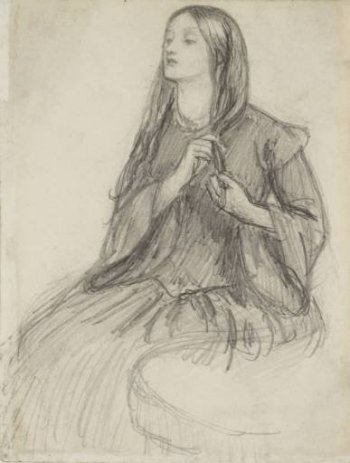
Elizabeth (Lizzie) Siddal
(1829-1862)
True Love
Farewell, Earl Richard,
Tender and brave;
Kneeling I kiss
The dust from thy grave.
Pray for me, Richard,
Lying alone
With hands pleading earnestly,
All in white stone.
Soon must I leave thee
This sweet summer tide;
That other is waiting
To claim his pale bride.
Soon I’ll return to thee
Hopeful and brave,
When the dead leaves
Blow over thy grave.
Then shall they find me
Close at thy head
Watching or fainting,
Sleeping or dead.
Elizabeth (Lizzie) Siddal poems
kempis.nl poetry magazine
More in: Archive S-T, Lizzy Siddal, Siddal, Lizzy
Thank you for reading Fleurs du Mal - magazine for art & literature